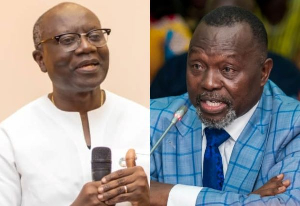It would be recalled that a letter dated December 31, 2023, which contained my appeal to the President of the Republic of Ghana to reconsider his decision on the said appointment, went viral after its first publication on GhanaWeb on January 6, 2024.
The said letter has received rave reviews posted on various social media
platforms or through personal calls to me. Whilst many have praised the epistle for its candid nature, others have admonished me to tread cautiously and be
circumspect to avoid falling into the vile traps of vicious, vitriolic, and
vindictive hammers who perceive individuals with shades of opinion divergent from theirs as nails to be driven deep into the woods.
I am eternally grateful to both sides of the coin but bemused at the latter’s concerns. Wherein lies the sincerity of the admonishments.
See something, say something
Be citizens, not spectators
A responsible adult should not sit aloof while the meeting place on the patio is being flooded with rainwater from a leaky roof.
Should we revert to the "culture of silence" era only to be rudely awakened by a song similar to ‘To wobo ase na fidie wura beba’ to wit, ‘Be patient, the trap’s owner shall arrive’?
I share their concerns, which may not be unrelated to the fact that reversal of
Decisions on appointments are an anathema to many in officialdom. Most
appointees are usually confirmed with an infinitesimally small number being
rejected. As far as they are concerned, my appeal is an exercise in futility because, at worst, it would be consigned to the dustbin of history after being branded a frivolous, vexatious, medicine-after-death (MAD) rantings of an ant fuelled by a pull-him-down (Ph.D.) syndrome’ piece.
I, however, trust that the Good Lord shall' make every mountain before us level’ with regard to any conundrum surrounding this appointment. Ultimately, some health insurance Zerubabbels and Necemiahs will arise to repair the broken walls of our beloved NHIS and ensure its financial sustainability.
Way of escape:
1 Corinthians 10:13 states: "No temptation has overtaken you except such as is common to man, but God is faithful, who will not allow you to be tempted beyond what you are able, but with the temptation will also make the way of escape, that you will be able to bear it."
The way of escape available to us now could be found in the statement announcing
the appointment, which stated, inter alia, "The appointment was done pursuant to
Section 15(1)(c) of the National Health Insurance Act, 2012 (Act 852), pending the
receipt of the constitutionally required advice of the Governing Board of the
Authority in consultation with the Public Services Commission."
The latter part of this statement presupposes that the Governing Boards of the
National Health Insurance Authority and the Public Services Commission have a
critical role to play in determining the suitability or otherwise of the appointee.
Prerogative of the president:
I wish, at this juncture, to apprise you of the principles underlying the prerogative given to the President to make appointments to the Public Service.
In the case of Ayine vs. Attorney General J15 of 2018 (2020) GHASC21 (13 May
2020), the learned Justices of the Supreme Court of Ghana sought to bring to the
fore, the reasons behind the prerogative given to the President to appoint persons to the public service. They relied on excerpts from the proposals of the Constitution Commission for the Establishment of a Transitional (Interim) National Government, 1978, paragraphs 123–124, which stated inter alia
The President should have freedom in appointing the team with which to implement programmes and policies; however, this discretion should not be untrammelled (limitless), particularly in the appointment of persons to perform sensitive functions in which a degree of impartiality and independence from the Executive is considered essential.
The system proposed does not oblige the President to work with persons he does not approve of or to entrust important state functions to persons whom he may not consider to be fit or capable of such functions. What the system does is require that the suitability of persons to be appointed to important state offices be passed upon by another authority other than the President. It is hoped that the President, aware of this extra test, will nominate and designate persons whose suitability and probability are such that they can expect to pass additional scrutiny.
This resulted in the establishment of two appointing bodies
The Public Services Commission, which the President will either consult
or designate his appointing functions of Public Officers to the Public
Service.
The President, acting in consultation with or on the advice of the
Council of State. Parliament is another authority that the President may
forward certain categories of his appointees for approval. Suitability is the quality of being right or appropriate for a particular person, purpose, or situation. Probity is the quality of having decency, strong moral principles, and honesty (integrity).
Role of the governing board of NHIA and Public Services Commission:
It cannot be denied that the additional scrutiny in terms of the suitability and probity of the appointee to be undertaken by the two entities should be done diligently to enable them to advise the President on the appropriateness or otherwise of the said appointment.
It is expected that in nominating the appointee, Mr. President would have done the necessary background checks, suitability, and probity by exercising CAVEAT VENDITOR (Let the seller beware), which cautions that the seller is responsible for any problem that the buyer might encounter with a service or
product.
However, the greatest responsibility lies with the receiving Public institution, NHIA, to exercise CAVEAT EMPTOR (Let the Buyer Beware) because individuals buy at
their own risk and potential buyers are admonished to do their research before
buying a product. This is pertinent because it is the NHIA that is conversant with the job specification (basic educational background, working experience, etc.) commensurate with established positions within the Authority. NHIA should
additionally, be guided by CAVEAT LECTOR (Let the reader beware) to enable the
entity to take careful note and undertake due diligence on whether the contents of any curriculum vitae presented by the appointee are accurate, relevant, reliable, and so forth.
Eventually, it is the NHIA that would furnish the Public Services Commission with the resume and evaluation of the appointee while in an acting position prior to the interview at the commission, where, together with other stakeholders, the suitability or otherwise of the appointee would be determined and the results forwarded to the President.
Enormity of the task before a prospective NHIA (OPS):
As stated earlier elsewhere, the Operations Division of NHIA is the fulcrum around which most activities revolve. The Division superintends the following directorates:
a) Claims (4 Claims Processing Centers)
Management Information Systems (Mis)
Strategic Health Purchasing
Quality Assurance (Clinical Audit and Credentialing)
Members And Regional Operations (16 Regions)
Research, Policy, Monitoring and Evaluation
Private Health Insurance
Special Projects
Each directorate is headed by a director. The job description of a DEPUTY
director at NHIA gleaned from a recent internal advertisement includes
a second degree, preferably a Masters degree in a relevant field, with ten (10) years of working experience. It stands to reason that a director at NHIA would have had at least a Masters degree and about 15 years of working experience (5 years or more after working as a Deputy Director).
One of the most sensitive and colossal responsibilities of the DCE (Ops) is that they have to peruse and approve almost every claim forwarded from the four claims processing centers through the Director of Claims for reimbursement to healthcare providers.
Claims account for about 80% of NHIA’S financial expenditure, giving a MEDI CAL
LOSS RATIO (Claims to Administrative Expenditure) of 80:20 compared to the
World Health Organization’s recommended Medical Loss Ratio of at least 90:10 for
the financial sustainability of social health insurance schemes. Simply put, Ghana’s NHIS has high administrative costs that are inimical to the financial sustainability of the scheme.
NHIA reimburses about GH¢ 120-150 million monthly (around GH¢ 1.44 to 1.80 billion per year) to healthcare providers as claims for services and medicines. Why would a country entrust such a duty to a health insurance neophyte without the foggiest idea about claims management and the use of benchmarks to determine outliers for claim adjudication prior to approval for reimbursement?
Granted that an astute outsider who is a team player could elicit the help of experienced directors in this venture, my trepidation is that her naivety could be exploited, culminating in the approval for payment of humongous claim overpayments (leakages) to healthcare providers, occasioned by collusion between NHIA staff and such providers for mutual financial gains—fraud and abuse.
I would not be surprised if some Directors have begun to offer a glib façade of
cooperation to obfuscate their deep revulsion of the said appointment.
Profile of Mrs. Louisa Atta-Agyemang:
It beats one’s imagination that neither the appointing authority nor the receiving entity has been able to furnish the public with the educational background and working experience of the appointee. Suffice it to say that the following information has been obtained from the Facebook and Instagram accounts of the appointee:
She holds a Bachelor of Laws (LLB) and a Bachelor of Arts in Communication and is currently pursuing a Master’s Degree in Peace, Security and Intelligence
Management. She handles Public Relations activities at Bulk Oil Storage and
Transportation Company Limited.
Experience:
Chairperson
Democratic Union of Africa, Full-time
Nov. 22 – Present: 1 year, 3 months
Skills: Strategic Planning, Fundraising and Public Policy
Vice Chair
International Women’s Democratic Union, Full-time
2022 – Present: 2 years, 1 month
President
Young Democratic Union of Africa, full-time
2020 – 2022 – 2 yrs
Political Organization
Skills:
Team leadership and policy advocacy
Youth Development
Secretary
National Union of Ghana Students (NUGS)
Part-time
2012 – 2013 – 1yr
She would have been a perfect additional appointee to the NHIA Corporate Affairs
Division if a vacancy existed. The situation even gets murkier when she is supposedly pregnant. Though pregnancy does not preclude anyone from being considered for a position for which their educational background and working experience make them eligible, the physical and psychological stress associated with pregnancy, coupled with the demanding and quagmire nature of the DCE (Ops) position, should have informed the appointing authority to ‘Festina lente.’
Barring any unforeseen circumstances, she would be eligible for a three-month
maternity leave in about four to five months if she were truly pregnant. There would then be a need to appoint someone to act on her behalf, all within the one-year left of the 4-year term of the appointing authority.
She has already started work, bringing along one or two preferred Personal
Assistants, reminiscent of the practice by Executive Management Members
appointed from outside NHIA. The downside of this practice is that because this
A cadre of personnel does not leave when the tenure of their political associates ends. The NHIA is often saddled with situations where their placements in other departments become problematic.
They might have been put on grades not in synch with the job specifications in NHIA. Left behind, they tend to bloat the administrative expenditure of NHIA, and the earlier the ‘You come politically, you go politically’ policy is made to cover this category of staff, the better.
The final decision:
As the nation awaits the decision of Mr. President on the petition with the gated breath, the onus is on the Governing Board of the NHIA and Public Services Commission to do the needful by undertaking a cost-benefit analysis of this appointment, taking into consideration, among other things:
Educational background and work experience
Skills required include working knowledge of Ghana’s Health System and
Social Health Insurance, especially our NHIS.
The risks associated with entrusting the approval for disbursement of a
humongous and gargantuan, circa GH¢ 1.8 billion annually to Healthcare
Providers of naiveté.
If diligently done, Mr. President would then have an evidence-based consultative
process to inform his final decision. The volte-face associated with the appointment of Dr. Dickson Osei Bonsu (Esq) as the Deputy National Security Coordinator in the most recent past gives a glimmer of hope that reversal of an appointment is possible depending on the preponderance of evidence available on the suitability or otherwise and probity of the appointee during the consultative process.
Opinions of Tuesday, 12 March 2024
Columnist: Emmanuel Obeng-Apori















